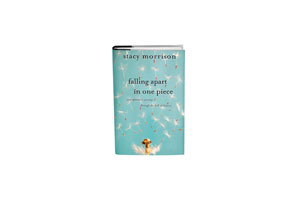Reading Questions for Falling Apart in One Piece
Warning: May contain spoilers

Photo: Ben Goldstein/Studio D
1. Throughout the book, Stacy uses the metaphor of a Shoji screen to describe her ability to compartmentalize and deal with the shock of her husband's sudden decision to leave, the ill-timed flooding of her brand new basement, the challenges of caring for a toddler, and the first stressful weeks at the helm of a major national magazine. Have you ever used this strategy to cope with difficult aspects of your own life? Were there ever times when you shut off certain thoughts or feelings for too long? Do you think Stacy ever fall into this trap of denial?
2. What are some of the other strategies Stacy develops by the end of the narrative that help her rebuild her family and stay sane without completely cutting Chris off from her life? How do you think her outlook has changed since she was an ambitious young adult trying to land her dream job?
3. Stacy has a strong but complicated relationship with her mother. How did it inform Stacy's career decisions? What lessons did it teach her about marriage?
4. How does Stacy use what she's learned in the high-pressure, tight-deadline environment of magazine publishing to deal with her problems at home? To what extent is she effective?
5. Social situations seem to put additional stress on Stacy and Chris's relationship: the trip to the Hamptons and the trip to the wedding in Maine highlight some of the differences in the outlooks and personalities. Why do you think this might be? What has changed since the early days of their relationship?
6. Amazed at Stacy's composure her friend Melissa says, "Stacy, where is your anger? I mean come on, I know you're a big thinker and you can explain anything, but are you even human?" (page 112) Why do you think Stacy remains so calm for so long? Can you think of times in your own life when your emotional response to a difficult event took you by surprise?
7. Stacy eventually does get angry after she and Chris are fully separated. Do you think the outburst triggered by Chris's request for compassion is a necessary step in the healing process, or does it represent a setback in Stacy's quest to rebuild a life free of the bitterness she sees among her divorced friends?
8. Stacy gets a great deal of advice from her friends throughout the book. If she'd come to you for advice, what would you have told her?
Read O's review
Get more reading guides
2. What are some of the other strategies Stacy develops by the end of the narrative that help her rebuild her family and stay sane without completely cutting Chris off from her life? How do you think her outlook has changed since she was an ambitious young adult trying to land her dream job?
3. Stacy has a strong but complicated relationship with her mother. How did it inform Stacy's career decisions? What lessons did it teach her about marriage?
4. How does Stacy use what she's learned in the high-pressure, tight-deadline environment of magazine publishing to deal with her problems at home? To what extent is she effective?
5. Social situations seem to put additional stress on Stacy and Chris's relationship: the trip to the Hamptons and the trip to the wedding in Maine highlight some of the differences in the outlooks and personalities. Why do you think this might be? What has changed since the early days of their relationship?
6. Amazed at Stacy's composure her friend Melissa says, "Stacy, where is your anger? I mean come on, I know you're a big thinker and you can explain anything, but are you even human?" (page 112) Why do you think Stacy remains so calm for so long? Can you think of times in your own life when your emotional response to a difficult event took you by surprise?
7. Stacy eventually does get angry after she and Chris are fully separated. Do you think the outburst triggered by Chris's request for compassion is a necessary step in the healing process, or does it represent a setback in Stacy's quest to rebuild a life free of the bitterness she sees among her divorced friends?
8. Stacy gets a great deal of advice from her friends throughout the book. If she'd come to you for advice, what would you have told her?
Read O's review
Get more reading guides



